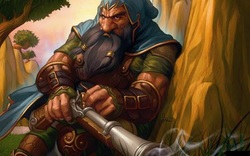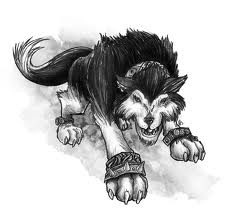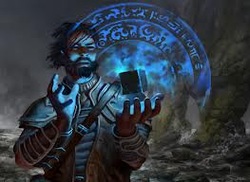 Previously, on Catacombs Talk Forum... Gamer Forge Listen Email: Name Simon Donovan Comment Gentlemen, My gaming question is this. When playing a wizard and creating magic items in 3.5 D&D is there a way to create those magic items without having to burn up experience points or if I have to atleast do it in a way that I don't have to burn a lot to do so? Thanks Gamer Forge Response: Oh, Oh! It's Magic! But it's also gonna cost you. When you're making items, DCR says: 1. Nope. It will always cost you XP. 2. But...it doesn't necessarily have to cost your own. Your DM may allow you to find a way to sacrifice someone else's XP. It's very evil, but it may be worth asking about if you're desperate to not cash in your XP. 3. If you can't sacrifice someone else, the cheapest route becomes making scrolls. They cost the least amount of your experience to make. That's why wizards begin play with the feat to do so. Gamer Forge Listen Email: Name Rick Richards Comment I'm starting to play Star Wars Saga edition and I don't want to play a Jedi or a sith. What is a good class to play and why? Gamer Forge Response: A long time ago, in a galaxy far, far away...DCR says: 1. The SW Saga Edition features five (and only five) core character classes, each balanced out so as not to overshadow each other. Jedi, Noble, Scoundrel, Scout, and Soldier. 2. Scoundrel features the most commonly used skill set, along with special Talents that negate frustrating penalties, suppress enemies' bonuses, and enhance your defenses and skills. As an added benefit, this class is rounded enough to fill in gaps that may be left open by the other, more specialized classes, like Soldier. 3. However, Noble is the underdog, here. They're not supposed to be the front line fighters, nor the "caster" specialties of the Jedi. But the special Talents will help your allies in almost any scenario. Also, the "Wealth" Talent straight up gives you money just for being alive. Just so that it's clear, let's put it on it's own line in bold, italic, underline: Free. Money. Gamer Forge Listen Email: Name Steven Broadbent Comment We are starting a world of darkness campaign. Any advise on how to run the game since this is my first time running this system? Gamer Forge Response: "World of Darkness" doesn't mean "World of Confusion". When taking on this scary world for the first time, DCR says: 1. Commonality. It doesn't really matter how much you love vampires, if nobody else in the game cares about vampires. Find the level where everyone meets as far as familiarity. If your gaming group is familiar with the movie "Monster Squad", then start in a world similar to that. When giving descriptions and examples, draw from that pool of knowledge as well. On the flip side, if a player isn't connecting to what you're offering, that player has every right to not play. Respect the player's decision to show up or not. 2. Learn the core mechanic. This would apply to learning any new game system. Before you start running, you've got to understand the core mechanics. All the nuanced stuff will come with time. If you have to look in the rulebooks just to find out how to determine success at an attack, then you quickly lose the trust and respect of the players. A GM should be regarded as an authority on the subject. 3. World of Darkness is filled to the brim with it's own lore. Tap that like you would a keg in college. Each book in the system is somewhat connected, so finding lore for you campaign setting is a breeze. It looks like a mountain when put next to each other, but remember that you can just take one and leave the rest. You've gotta put on training wheels before you can ride the ten-speed. *Bonus XP: To help get players psyched up for playing a game set in a universe closer to the real world, start with the music. If you've got a half-decent laptop loaded with music, try loading that puppy up with some tunes that might help fit the mood. Get some player input about the sorts of things they would hear in a supernatural thriller. To give that extra kick in the pants, try creating several playlists to reflect radio stations, so when characters hop into a car, have a radio station turn on and start playing. It's a little more effort to put it together, but so worth it once players begin to "get it" and feel more connected to the world that they are helping shape. For help in getting started, just turn on your radio in your own car, and scribble some quick notes on five or six random stations. Also, playing the classic Grand Theft Auto: Vice City is a great way to start. The music makes for a more personable, if not perfect, immersion experience.
0 Comments
 Gamer Forge Listener Email: Name Mark Jacobsen Comment A friend of mine is planning for a campaign in a colonial/pirate setting, and is planning on re-skinning crossbows as firearms, (i.e. light crossbow = musket, hand crossbow = flintlock), but I was wondering if there were already rules for such weaponry. Gamer Forger Response: Catch-a-Gun! Uggghhh. That sounds bad, just typing it. When you a crossbow just won't cut it for your pirate, DCR says: 1. The DMG says 1d10 with a times two critical multiplier. Fantasy settings often don't give much love to firearms, even Renaissance-era flintlocks. So, unfortunately, that's all the official answer gives us. 2. However, D20 Modern gives a host of options with your firearms. The books Ultramodern Firearms and D20 Weapons Locker give all the deets about all the guns you will ever need, including the stats and damage for the game. If you were expecting some huge damage rolling because it's "from the future", then prepare for disappointment. most guns comes up as 1d10 with a times two critical multiplier. Just like it says in the DMG. Most game systems give all the rules for firearms, and most just carryover from setting to setting. You just won't get the ridiculous damage rolling no matter where you go.  Gamer Forge Listener Email: Name Walter Smith Comment I’m just curious if any supplement out there includes an Animal Companion that is not, in fact, an Animal. As in the type. I mean that just any Druid of sufficient level can take; there are probably feats that allow you to get nonstandard Companions from other types, but I mean just ordinary “Animal” Companions. Bonus points if the Animal Companion in question is an Aberration, Dragon, Elemental, Magical Beast, or Plant, and thus qualifies for Rapidstrike. Super bonus points if you find a Construct or Undead, because that would just be weird. Gamer Forger Response: Catch-a-Familiar! Okay, just had to try again. That's the last one, promise. When your run-of-the-mill familiar just isn't sitting at the cool kids' table, DCR says: 1. Familiars can often be designated as any commonplace animal. Part of the point of the familiar is that, by themselves, they don't stand out very much. Most familiars confer a small, one-time bonus at the start of game play. Usually a small bonus to a skill or a small, special attack the familiar can do. It's what the familiar does over time is what makes them special. 2. If you want a familiar that is not only different, but almost diabolical, try a humunculous. It's a familiar that is constructed from the master's own blood. It behaves in the same way as a normal familiar does, just more...gross?  Gamer Forge Listener Email: Name Rick Bosco Comment Why are wizards and their ilk so restricted in their choice of personal armor in most fantasy roleplaying games? (...let alone novels etc.) Sure, learning takes up a lot of time, especially about such an arcane and cryptic subject as magic - but this is just a stereotype. Games and worlds could both easily be designed otherwise. Why is this stereotype so prevalent, and where does it come from? Gamer Forger Response: Does the clothes make the hero? DCR says: 1. Armor, in all actuality, is bulky and restrictive. There's nothing in the rules that says you absolutely cannot wear armor, it's just never recommended. A sorcerer's/wizard's movements are commonly the most important aspect of the magic. It's more dramatic that way, trust us. Also, mages become some of the most potent damage dealers around. So a heavy cannon that also becomes impossible to damage? Talk about unbalanced! 2. Lightning Rod! It's about the real-life repercussions of what you're doing. A fireball is very, very hot. When you wrap some meat in tinfoil and make it very, very hot, what happens? It cooks! Remember, a mage in heavy plate mail acts as a lightning rod when casting lightning spells, and becomes terribly frozen when using cold spells. However, you can double-dog dare a party member to stick their tongue to your armor right after casting "Touch of Frost" on yourself. Just saying. 3. Action heroes! Bruce Willis wasn't awesome in Die Hard because he was wearing heavy armor. Hell, he wasn't even wearing shoes! Star Wars Saga Edition best reflects the action hero mentality with an ever-increasing defense. So, we say NOT wearing armor has it's merits, so don't knock it. Unless, of course, you want to make a few extra coin by double-dog daring someone. *Bonus XP: To go the extra mile, take a few minutes and give your familiar a bit of personality. A simple quirk to draw a little more attention to it and have a little fun with it. But remember that the character is the main focus, so don't stress the familiar too much. Archemedes from the animated Sword in the Stone is a classic example of a familiar. Not very exotic. Quirky. Understated. Relevant. All the makings of a great supporting character. Gamer Forge Listener Email:
Name: Regan Comments: This question about Charm Person got me musing about a problem with the spell. Obviously, you can't cast Charm Person in the middle of a forum to sway an interlocutor to your side without the other 20 persons noticing the foul play. And yet, I'd find it incredibly cool if it was somehow pulled off in a game. My question is thus : Is there any mean to covertly cast a spell in d&d3.5 / Pathfinder ? I've thought about Quicken Spell but nothing in the feat description indicates that you're not noticeable in doing this (as the spell still "takes an action", be it a swift one). Gamer Forge Response: This was a hard one. No joke, it was difficult. But when getting the most of a charm, DCR says: 1. You're gonna need a distraction. It's called a Tennessee Shuffle. When everybody is looking left, you move right. Have one of your companions run interference by causing a commotion. Fake a seizure or something. Uncontrolled outburst from the gallery. Something. This will give the player the moment he/she needs to begin casting the charm. It's not very sophisticated, but when being sneaky, its all about subtlety. 2. Just how subtle can you be? You've got several dozen, if not a hundred people actually watching you as you do this. No pressure, right? The key to winning this will be hiding the charm in your argument. We were reminded of an old "Pinky and the Brain" episode where a scheme involved hiding a subliminal message in a paragraph. This phase of the plan will involve all of your wits and charisma, as one slip of the tongue and you are BUSTED! To tip the scales in your favor, construct your argument to include certain phrases and the final sentence will have a sort of "trigger word" to have it take effect. But none of that will matter unless... 3. Do your homework. Find out who will be attending the gathering and make sure that no one will be actively looking for magical influence. This will be the easiest step, and the most crucial to the plan. None of this will work if you have the extra scrutiny centered on you. In general, when making and executing a dastardly plan like this, just take precautions. Oh, and have and escape plan! Gamer Forge Listener Email: Name: Jacob Stevens Comments: Gentlemen, My name is Jacob and I live in Raleigh, North Carolina. I have been listening to your show over the years. I started way back when it was just Revan and Malak. Those shows were interesting to say the least but over the years the show has really matured and grown into a really solid show. Even with the ups and downs you have experience over the years. So down to my question. When running a campaign, especially one with newer players mixed with optimizers, is it a fair call to limit the variety of books available for play? For feats, classes, prestige classes, magic items and spells? (or whatever other variants exist in whatever other system and it's expanded rulebooks) It seems that this would be quite unfair to the optimizer, but not doing so comes across as unfair to the beginner. Barring the idea to just separate these two breeds into different play sessions, is limiting the variety of books a sign of fair DMing, bad DMing or neither? Gamer Forge Response: Yay! We got to do two topics this week! When laying down the ground rules, DCR says: 1. If you're not sure, just start simple. Especially when introducing players who are new to the RPG experience, it's best to have finite options. It can cause a great deal of frustration for a new player to have to pour over a mountain of books to find something, when a core class will do just fine. Besides, it's counter-productive to have more information than you need. Just ask a librarian. Start your game by allowing only the core rulebook for the players. More experienced players may scoff and give you some sass for this, but this is your game, and you run it as you please. 2. Grow with the players. As the players grow, and characters live and pass (as they tend to do in a good adventure), slowly grow the source materials in which they are allowed to draw. We feel that this cultivates a true "win-win" situation for both new and experienced players. Compromise is best when resolving issues between players. 3. It's best to understand. Rather than force your will on others (which we are almost always against), clearly and concisely explain what the decisions are and stick with it. However, don't thumb your nose at logic and reason. These are your friends and deserve your respect and consideration. If someone comes up with a good reason to play as something out of a different book, take a closer look and make a decision after getting the facts. Starting a new game should be neither tedious nor heart-breaking. *Bonus XP: Always be on the lookout for players' ingenuity! If a player has access to a phone app that has a full spell listing for your game, then more power to them! Let them use that. If they use their tablet computer to store their books on .pdf files, then that makes the GM's job all that much easier. These are some great "win-win" scenarios that can make a new player feel more efficient and adapt to a new game with ease. Gamer Forger Listener Email:
Name: Alison Comments: Okay I am in some serious trouble here. I recently decided to try and play a mage in my gaming group and up till now I have only ever played rogues or fighters. I really feel like I am way over my head. I forget half the spells I have memorized for the day and I really feel like I am dragging my team down. Please help me!! Gamer Forge Response: When playing as a wizard (or any kind of mage), DCR says: 1. Index cards, plastic card sleeves, binders, and dry erase markers are your new best friends. Many gaming websites have specialty cards that can be printed for free, and include all the info you will need to keep things organized. Its important to have the info separated and itemized, so it can be easily read at a moment's notice. Include things like relevant key abilities and material components, along with the number of die used to calculate area of effect, damage, and duration. Keeping them in card sleeves or a card binder makes them even more organized and when used, the dry erase markers can be used to simply cross them off your list for the day or encounter, and then easily wiped clean when refreshed. 2. Play multiple roles. Contemporary RPG books define mages as a "controller". Don't be fooled. You can do more than this. Sure, fireball hurts multiple enemies simultaneously, but what about using it to create water by melting all the ice in ice troll's cavern? Every new area you walk into, think of how each of your spells can be used on the surroundings. Slow down your enemies so the heavy hitters can do their job or make it easier for the thief to sneak in or out of something. Shoehorning your mage with a role like "controller" is just plain silly. 3. Knowledge is your best defense. Your are, in theory, a smart character. Play that way. Know when running is better than standing and fighting. You are squishy like a soft nougat. You wear little to no armor. You aren't supposed to enter the fray. No one would hold it against you for keeping your distance. "He who fights and runs away, can live to run away another day." |
The GamerForge is DungeonCrawlersRadio’s most favoritist segment of the entire show. Have you ever had a boggling rules question that no one in the group can figure out? Write in to us and we’ll help try to solve it! Are you a Game/Dungeon Master who needs help squashing animosity at the table or dissension in the ranks? Perhaps we can help!
If you are in need of help, encouragement, or an uber devious way to get a TPK, we are here to help. No matter your needs, we’ll help you get more from your gaming! The Gamer ForgeWhere Players & Game Masters can come for valuable information to level up your game! Archives
August 2013
Categories
All
|
 RSS Feed
RSS Feed








